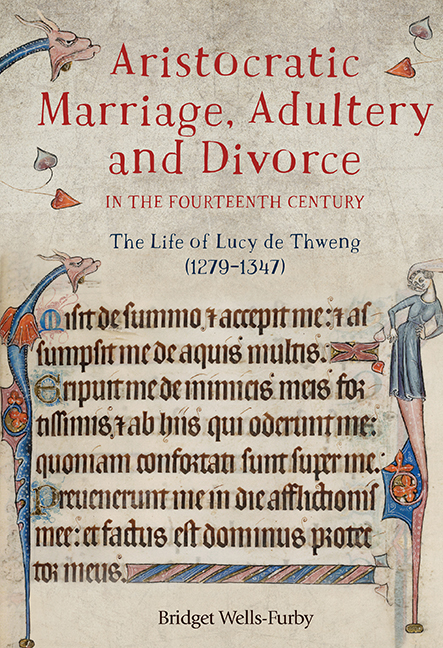 Aristocratic Marriage, Adultery and Divorce in the Fourteenth Century
Aristocratic Marriage, Adultery and Divorce in the Fourteenth Century Book contents
- Frontmatter
- Contents
- List of Illustrations
- Acknowledgements
- List of Abbreviations
- Note on the Text
- Introduction
- Map
- 1 Birth and Family; Inheritance and Disinheritance
- 2 Wardship and First Marriage
- 3 Separation and Divorce
- 4 Adultery and Fornication
- 5 Second Marriage
- 6 Widowhood
- 7 Third Marriage
- 8 Death
- Summary and Conclusions
- Bibliography
- Index
Introduction
Published online by Cambridge University Press: 04 April 2019
- Frontmatter
- Contents
- List of Illustrations
- Acknowledgements
- List of Abbreviations
- Note on the Text
- Introduction
- Map
- 1 Birth and Family; Inheritance and Disinheritance
- 2 Wardship and First Marriage
- 3 Separation and Divorce
- 4 Adultery and Fornication
- 5 Second Marriage
- 6 Widowhood
- 7 Third Marriage
- 8 Death
- Summary and Conclusions
- Bibliography
- Index
Summary
This book began as a fresh look at the life of the Yorkshire heiress Lucy de Thweng (1279–1347) and, in the process, became a wider survey of the role of women within the landholding society of fourteenth-century England. It is a ‘biography’ only in a sense. While there is a certain amount of information about Lucy in surviving records, and a great deal more than there is for most women of her rank, this is largely limited to evidence of how the secular and ecclesiastical authorities reacted to the events in her life. There is little that is personal to her, only two charters and her will, and no private letters or statements, such as that made by Elizabeth de Burgh in 1326, or even any manorial or household accounts. Her voice is missing but nevertheless her life can be illuminated by comparison with other women who went through the same experiences. This involves discussion of the inheritance of land by women and their disinheritance, the marriage of underage wards, private and official marital separations, divorce, adultery, bastardy, widowhood and the remarriage of widows. All of these could have great influence on the descent or prosperity of landed estates, whether the women involved were active or passive players. The estates of the aristocracy underpinned every important aspect of their lives, from their local and national political authority to their very identities as members of a particular lineage. Any factor that influenced the estates is naturally of interest and, while marriage has long been recognised as such, this study expands understanding into less well-known paths.\
Lucy was the only surviving child of Robert de Thweng, eldest son of Marmaduke de Thweng and his wife Lucy de Brus, sister and coheir of Peter de Brus (d.1272). Robert predeceased his father and Marmaduke arranged for his estate to pass to his second son, another Marmaduke, but his wife's Brus lands passed to the younger Lucy who had inherited them by May 1285. Her marriage was acquired by William Lord Latimer (d.1304) and Lucy was married to his eldest son, William (d.1327), by August 1294. A son was born to them around 1300, apparently their only surviving child, but in December 1303 Lucy left him, with the assistance of her uncle, Marmaduke de Thweng, and began proceedings for divorce.
- Type
- Chapter
- Information
- Aristocratic Marriage, Adultery and Divorce in the Fourteenth CenturyThe Life of Lucy de Thweng (1279–1347), pp. 1 - 10Publisher: Boydell & BrewerPrint publication year: 2019


